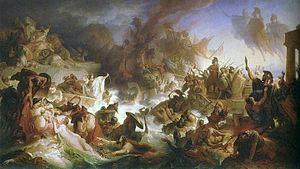Early on in Heaven's Breath: A Natural Study of the Wind, his magisterial examination of wind, Lyall Watson describes the wind's role in various historical events. In particular, he notes two of the most pivotal battles in ancient and early modern history. One is the Greek triumph over the Persians at the Battle of Salamis in 480 BCE, the other is Britain's defeat of the Spanish Armada in 1588 CE.
In both instances, it was wind that ensured the outcome of the fight. With his intimate knowledge of wind patterns in the Gulf of Argos and the Aegean Sea, the Greek commander Themistocles managed to lure a much larger Persian fleet into a place in which the Persians were at the mercy of the prevailing waves and winds. Had the Greeks not won, the world may not have been introduced to the powerful philosophical and political observations on which we base Western civilization.

Similarly, although the British navy did indeed defeat the Armada in open sea combat, its task was made much, much easier by a powerful southwesterly wind which had previously hit and seriously crippled the Spanish fleet. The armada that Britain fought in the Straits of Dover was a pale facsimile of its original size. As a result, Protestantism went on to flourish in England and, eventually, the entire British empire. One subsequent outcome was the founding of the United States of America.
What's the point? Although actors on both sides of these conflicts undoubtedly prayed that their god would prevail, we are left to wonder how did, if God did take sides, an unanswerable question at best, his action interface with that of the actions of the natural world. Whose action really prevailed?
And whose history is most important in the eyes of the divine?
No comments:
Post a Comment